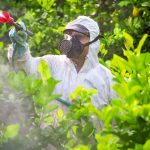EPA ignores link between paraquat and Parkinson’s disease
 (NaturalHealth365) Despite the mounting evidence linking paraquat to Parkinson’s, the Environmental Protection Agency (EPA) stubbornly refuses to acknowledge it, regardless of the increasing body of research.
(NaturalHealth365) Despite the mounting evidence linking paraquat to Parkinson’s, the Environmental Protection Agency (EPA) stubbornly refuses to acknowledge it, regardless of the increasing body of research.
How many studies, reports, and research papers must surface before the EPA takes decisive action? Despite the continuous influx of evidence showcasing the weed killer’s toxicity, the agency persists in endorsing paraquat’s use by farmers and food producers in our country.
Ongoing allegations against agrochemical companies continue
In March 2022, more than 600 lawsuits were filed against Syngenta, a Chinese-owned agrochemical company, for its use of paraquat. These lawsuits claimed that the company was marketing the product, although it was fully aware of the dangers it presented to humans. Before that, Monsanto was called to the carpet for similar allegations.
This ongoing struggle indicates that the EPA is well aware of these genuine hazards, as evidence continues to be repeatedly presented to the agency, with each new study or report drawing the same conclusions.
EPA supports toxic weed killer, despite mounting evidence of harm
Sad, but true, the EPA doesn’t want to hear anything that might threaten the profitability of the chemical industry. The agency continues to dismiss the scientific evidence that is backed by years of research, ignoring overwhelming proof linking paraquat to Parkinson’s disease.
The Michael J. Fox Foundation for Parkinson’s Research submitted new research, as did many others, showing that not only is paraquat a threat but also that the company that manufactures paraquat intentionally misled agency regulators about the existence of a link to Parkinson’s.
While countries around the globe have banned paraquat, the EPA continues to close its eyes to the truth placed before it and allows these companies to carry on business as usual.
Profits over public health: Are food producers putting your well-being at risk?
Make no mistake, numerous food producers in this nation prioritize profit over the well-being of you and your loved ones. Part of the dilemma contributing to the EPA’s hesitation regarding paraquat stems from the resistance it faces from the country’s food producers and farmers.
An analysis of public comments submitted in response to the Paraquat Dichloride Registration Review reveals widespread opposition to any potential restrictions. Agricultural giants like Syngenta vehemently deny the overwhelming evidence linking paraquat to Parkinson’s disease, not only submitting letters disputing these findings but also offering extensive rebuttals on their websites.
Comments dating back to 2016 illustrate significant resistance from various farmers, as well as organizations like the Florida Fruit and Vegetable Association and the American Farm Bureau, against the EPA’s proposed mitigation measures and regulations concerning paraquat.
While farmers’ livelihoods are undoubtedly crucial, the value placed on human life should be paramount. Prioritizing profit over the health and well-being of the individuals they feed reflects distorted priorities. Ultimately, it all boils down to financial gain, with little regard for the human cost.
This ongoing battle among food producers is driven by the pursuit of maximum production and profit. Unfortunately, the devastating toll on human health is merely collateral damage in this profit-driven conflict.
How to protect yourself and reduce your exposure
Paraquat poisoning can occur by ingestion, inhalation, and skin exposure. Eating or drinking food and beverages that have been contaminated with paraquat can cause serious health problems, including premature death.
If you have directly come in contact with the product, remove your clothing as quickly as possible and clean them before using again. Then wash yourself thoroughly. If you have ingested the product or come in contact with it on your skin, seek emergency medical care.
If you do not work in farming or agriculture, you are not likely to come in direct contact with paraquat. Your exposure will come from the food you eat if that food has been sprayed with it.
There are several ways to reduce or eliminate your exposure to paraquat.
- Choose organic foods when possible, including fruits, vegetables, grains, soy products, and other foods
- Wash your hands thoroughly before and after handling fresh vegetables and fruit
- Wash all fruits and vegetables, even if you are not planning to consume the skin
- Use a wash of vinegar
- Soak produce for 20 minutes in either salt water, vinegar, or baking soda (1 teaspoon baking soda to 2 cups water)
- When handling cabbage, lettuce, and other leafy vegetables, remove and discard the outer leaves
- Any produce that can be peeled should be peeled if not organic
- Firm produce like potatoes and melons should be scrubbed using a vegetable brush
- Soft produce such as grapes should be cleaned by holding them under running water and rubbing them gently
Remember, you hold the power to safeguard your health and welfare. Take proactive measures to minimize your exposure to paraquat. Engaging with your elected representatives could also make a difference. The greater the collective outcry against this health threat, the higher the likelihood of halting these harmful practices.
Sources for this article include:
EWG.org
FederalRegister.gov
Regulations.gov
Regulations.gov
Syngenta.com
Regulations.gov
Regulations.gov
CDC.gov



